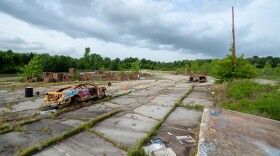
Molly Samuel
Molly Samuel joined WABE as a reporter in November 2014. Before coming on board, she was a science producer and reporter at KQED in San Francisco, where she won awards for her reporting on hydropower and on crude oil.
Molly was a fellow with the Middlebury Fellowships in Environmental Journalism and a journalist-in-residence at the National Evolutionary Synthesis Center.
She's from Atlanta, has a degree in Ancient Greek from Oberlin College and is a co-founder of the record label True Panther Sounds.
-
Former Sen. Max Cleland of Georgia has died. He was 79 years old. He lost three limbs in Vietnam, but that didn't stop him from seeking higher office, where he advocated for veterans and the disabled.
-
Even as climate change makes wildfires more frequent and intense, more people are moving to fire-prone areas. The fastest such growth is in the Southeast, where few consider wildfire much of a threat.
-
The Southeast U.S. is one of the only places in the world where loggerhead sea turtles nest. But the state of Georgia is concerned they now face a threat from a federal change in ship canal dredging.
-
A brick factory that was key to building post-Civil War Atlanta used unpaid convict laborers. Now, some hope to block industrial development at the site and instead memorialize those mistreated there.
-
Power shut-off moratoriums imposed at the start of the pandemic are beginning to expire. Customers and utilities face a backlog of missed bills that may eventually be passed on to ratepayers.
-
When scientists boarded an Arctic research ship, the coronavirus had been detected only in China. Life now feels surreal as they socialize normally, trying to imagine the global pandemic shutdown.
-
A massive 656-ft. cargo ship filled with thousands of new cars has been stuck, capsized off the Georgia coast for months. Now, crews are getting ready to dismantle the ship and remove it piecemeal.
-
Winters are warming faster than summers in many places, and colder parts of the U.S. are warming faster than hotter ones. The warming winter climate has year-round consequences across the country.
-
Dozens of cities have ambitious plans to get their electricity from clean or renewable sources. But those goals can clash with power providers, whose priority remains economics, not climate change.
-
When an animal is listed as endangered that can be bad news for nearby businesses. That's why Georgia's biggest utility is helping to protect the slow-breeding gopher tortoise.
-
Construction of new, modern reactors seemed to herald a new era of nuclear power expansion in the U.S. Now all but one of those projects have been canceled.
-
In 2014, after disastrous spills and opposition from environmentalists, the Environmental Protection Agency imposed new rules on the storage of coal ash. Now utilities are planning to close down the ponds that hold the toxic ash, but it has to go somewhere. Environmentalists say the safest place for it is in securely lined landfills, such as the municipal landfill in Wayne County, Ga. Locals are fighting the plan, but there's not much they can do.








